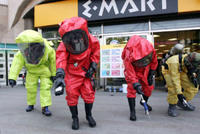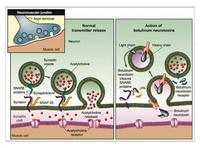-
Faster method to identify Salmonella strains
There are more than a million estimated cases of salmonellosis annually in the United States, resulting in approximately 400 deaths, nearly 20,000 hospitalizations and an economic burden of millions of dollars. New method may significantly reduce the time it takes health officials to identify Salmonella strains.
-
-
U.S. unlikely to meet its biofuel goals

The Energy Independence and Security Act of 2007 (EISA) mandates that by 2022 the United States derive fifteen billion gallons per year of ethanol from corn to blend with conventional motor fuels. A new study says that if the climate continues to evolve as predicted by the Intergovernmental Panel on Climate Change, the United States stands little to no chance of satisfying its biofuel goals.
-
-
Health impact of Chernobyl accident overestimated: study

The impact of the Chernobyl nuclear accident has been seriously overestimated, while unfounded statements presented as scientific facts have been used to strangle the nuclear industry, according to Russian researchers.
-
-
Current methods of reducing arsenic contamination of water are not effective
Arsenic is now recognized to be one of the world’s greatest environmental hazards, threatening the lives of several hundred million people. Naturally occurring arsenic leaches into water from surrounding rocks and once in the water supply it is both toxic and carcinogenic to anyone drinking it. New research finds that most of the current technologies used around the world to reduce arsenic contamination are ineffective.
-
-
Letters containing ricin sent to Mayor Michael Bloomberg, gun-control advocacy group

Two letters sent to Mayor Michael Bloomberg – one to his office in New York, the second to the Washington, D.C. offices of Mayors Against Illegal Guns, a non-profit gun-control group he has founded — contained traces of the deadly poison ricin.
-
-
Spokane, Wash. biolab could be closed due to budget cuts
Just two weeks ago, law enforcement agencies credited a bioterrorism laboratory in Spokane, Washington with quickly identifying the substance in several letters mailed to people in town as ricin. These same agencies now say that the biolab could close as a result of budget cuts.
-
-
Improving “crop per drop” boosts global food security, water sustainability
New study shows increasing crop water productivity could feed an additional 110 million people while meeting the domestic water demands of nearly 1.4 billion.
-
-
A majority on Earth will soon face severe, self-inflicted water shortage: scientists

A conference of 500 leading water scientists from around the world, held last week in Bonn, issued a stark warning that, without major reforms, “in the short span of one or two generations, the majority of the nine billion people on Earth will be living under the handicap of severe pressure on fresh water, an absolutely essential natural resource for which there is no substitute. This handicap will be self-inflicted and is, we believe, entirely avoidable.”
-
-
Smartphone turned into handheld biosensor

Scientists and physicians in the field could soon run on-the-spot tests for environmental toxins, medical diagnostics, food safety and more with their smartphones. Researchers have developed a cradle and app for the iPhone that uses the phone’s built-in camera and processing power as a biosensor to detect toxins, proteins, bacteria, viruses, and other molecules.
-
-
Oregon drills first responders for bioterrorism attack

A three day drill called the Portland Area Capabilities Exercise (PACE), simulating a terrorist attack involving a biological weapon, will take place across fifty different facilities and sixty-five jurisdictions in the state of Oregon.
-
-
Ricin can kill, but there are more potent bioterror weapons
Ricin was in the headlines a few weeks ago, when envelopes containing the poison were mailed to President Obama, Senator Roger Wicker (R-Mississippi), and a Mississippi judge. The threat from ricin is low, however, because ricin cannot poison someone through contact with the skin. To be poisoned, an individual would have to ingest or inhale traces of the poison.
-
-
New malaria test kit would help global elimination efforts

A new, highly sensitive blood test that quickly detects even the lowest levels of malaria parasites in the body could make a dramatic difference in efforts to tackle the disease in the United Kingdom and across the world, according to new research.
-
-
Bird flu in live poultry markets source of viruses causing human infections

Following analysis of H7N9 influenza viruses collected from live poultry markets in China, it was found that these viruses circulating among birds were responsible for human infections. These results provide a basis for the government to take actions for controlling this public health threat.
-
-
Studying botulinum genome to understand botulism harm

The toxin that causes botulism is the most potent that we know of. Eating an amount of toxin just 1,000th the weight of a grain of salt can be fatal, which is why so much effort has been put into keeping Clostridium botulinum, which produces the toxin, out of our food.
-
-
Potential flu pandemic looms
In the summer of 1968, a new strain of influenza appeared in Hong Kong. This strain, known as H3N2, spread around the globe and eventually killed an estimated one million people. A new study reveals that there are many strains of H3N2 circulating in birds and pigs that are genetically similar to the 1968 strain and have the potential to generate a pandemic if they leap to humans.
-
More headlines
The long view
We Ran the C.D.C.: Kennedy Is Endangering Every American’s Health
Nine former leaders of the Centers for Disease Control and Prevention (CDC), who served as directors or acting directors under Republican and Democratic administrations, serving under presidents from Jimmy Carter to Donald Trrump, argue that HHS Secretary Roert F. Kennedy Jr. poses a clear and present danger to the health of Americans. He has placed anti-vaxxers and conspiracy theorists at top HHS positions, and he appears to be guided by a hostility to science and a belief in bizarre, unscientific approaches to public health.
